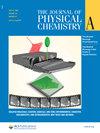pH-Dependent Adsorption and Conformational Change of Ferritin Studied on Metal Oxide Surfaces by a Combination of QCM-D and AFM
IF 2.781
引用次数: 42
Abstract
In this work, we have identified key parameters for controlling the surface density of ferritin on metal oxides and observed a conformational change of the protein shell of ferritin occurring exclusively at pH 4. The quartz crystal microbalance with dissipation (QCM-D) monitoring technique was used to examine protein adsorption on gold and Ti-, Si-, Ta-, Al-, and Nb-oxide surfaces. A comparative study of the adsorption to Ti-oxide was made using atomic force microscopy (AFM). The surface density of ferritin was controlled by a variation in the solution pH (from 2 to 8) and the isoelectric point (Ip) of the surface. On the basis of these findings, clear trends in the effect of electrostatic interactions between the ferritin proteins and between ferritin and the surface were found, making it possible to tune the surface density of ferritin through the choice of solution pH and the Ip of the surface. Furthermore, the influence of the pH on the viscoelastic properties of the adsorbed ferritin layer was examin...QCM-D - AFM联合研究铁蛋白在金属氧化物表面的ph依赖性吸附和构象变化
在这项工作中,我们已经确定了控制铁蛋白在金属氧化物表面密度的关键参数,并观察到铁蛋白的蛋白质壳只发生在pH 4下的构象变化。利用石英晶体微天平耗散(QCM-D)监测技术,研究了蛋白质在金、钛、硅、钽、铝和铌氧化物表面的吸附。利用原子力显微镜(AFM)对钛氧化物的吸附进行了比较研究。铁蛋白的表面密度受溶液pH(从2到8)和表面等电点(Ip)的变化控制。在这些发现的基础上,发现了铁蛋白蛋白之间以及铁蛋白与表面之间静电相互作用的明显趋势,从而可以通过选择溶液pH和表面Ip来调节铁蛋白的表面密度。此外,还考察了pH对吸附铁蛋白层粘弹性的影响。
本文章由计算机程序翻译,如有差异,请以英文原文为准。
求助全文
约1分钟内获得全文
求助全文

 求助内容:
求助内容: 应助结果提醒方式:
应助结果提醒方式:


